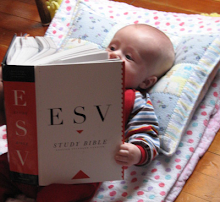
Bravo!!! Dr. Clark Hit a home run here, i couldn't have said it any better than this. If you do not read Scott Clark's Blog, you should start to. It is a fount of rich theology and understanding of Reformed Theology. You can find it HERE.
Here are his thoughts on Childrens Church. Stop taking the kids and youth away from the communion of the saints!!!
THE MYSTERY OF CHILDREN'S CHURCH
BY DR. SCOTT CLARK
I do not understand why so many ostensibly Reformed congregations have adopted the practice of dismissing their covenant children from the service to “children’s church” (or whatever more clever name it may have). From what I see this appears to be a common practice. Sometimes the bulletin explains that the children are sent out of public worship in order to “prepare them to worship.” Really? This seems like sending one’s child from the dinner table in order to prepare them to eat.
I understand the practical problem. At least some of the same congregations that have this practice also do not set aside time outside of the worship service for Christian instruction or catechism. So, it seems, they’re holding catechism during the worship service. I guess that the reason that there’s no additional time for catechism is that the parents won’t make time and the church won’t make them make time. So, congregations are making due.
It’s hard to know where to start with this complex of problems. Obviously there is a misunderstanding of the nature of the Sabbath. There’s a misunderstanding of the nature of worship. There’s a misunderstanding of the nature of baptismal vows and church membership. There’s a misunderstanding of Christian nurture and there’s a misunderstanding of the nature of Christian parenting. Other than these things, as they say, “it’s all good.”
In such a case, the act of sending children out of the the stated service for instruction sends a more powerful message than the instruction is likely to send. It sends the message to the children that they are not really members of the covenant community. It sends the message that the gathering for public worship may be marginalized if something else is deemed more important. It sends the message that it’s acceptable to arrange one’s priorities during the week so as to require this ad hoc solution, that church is something we do but not something we are.
Underneath all of this there is another series of misunderstandings: Of what we are, who Jesus is, what he did, and what the implications are for those who would follow him.
We may look like happy, upwardly mobile suburbanites but we’re not. We’re wretched, horrible people by nature. That manicured lawn covers over a multitude of hell-deserving sins. We’re gossips, murderers, adulterers, and God-haters. If the children’s church-sending parents understood that, if they really believed that about themselves and their children, they would find time during the week to see that their children are instructed. They would be catechizing their children, praying with and for them. Then it wouldn’t be a matter of squeezing a little instructional time into the Sabbath. They would be pleading with the minister to teach their children.
If we saw ourselves for what, but for the grace of God, we really are then we would understand the grace of God. If we understood the grace of God, we would more and more embrace the consequences of following Jesus. Death to self entails death to the successful suburban lifestyle where that lifestyle marginalizes Christ and his church. Jesus didn’t come to facilitate a happy, upwardly-mobile lifestyle and discipleship calls us to die to the mall and live to Christ.
Yes, having children in church means that it will be slightly less entertaining and possibly less moving emotionally. It’s a little harder to be enraptured by the latest chorus when your child is fidgeting next to you or someone else’s is wailing in your left ear. That’s okay. You might not have the same emotional “high” this week as you did when their was children’s church. That’s okay. Worship isn’t about your experience of religious ecstasy. It’s about hearing God and responding appropriately, according to his Word.
God doesn’t mind that your emotional experience is less intense. He takes the long view. Your children will grow up not segregated from public worship and the means of grace. They’ll grow up a part of the community of the redeemed and watching baptisms (so they can see what happened to them). They’ll see the supper administered and they ‘ll ask, “When can I have it?” They’ll hear the Law and the Gospel (Dv) and they’ll grow up knowing that this is their identity, that it’s really true, that God said, “I will be your God and your children’s God.”
Church leaders don’t want to challenge parents and parents don’t want to be challenged. The cycle has to end somewhere. It should start with pastors and elders. That’s why they call it leadership. A leader goes first. A leader takes the risk. Elders and pastors need to get over their desire to be popular, to be liked, to be “successful.” Perhaps the reason that parents don’t see any contradiction between their definition of “success” and the Christian life is because their pastors and elders haven’t shown it to them?
Children’s church is a problem but it’s not the problem. It’s a symptom of much larger problems. It’s not too late, because it’s never too late to repent. Grace is free for everyone, pastors and parents alike. God bless those noisy congregations with fidgeting and fussy children. Let the noise of children inhabit all our congregations.



I agree completely. Great post.
ReplyDelete